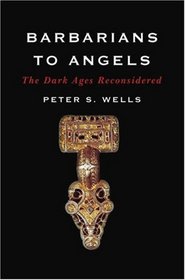In a thrilling revelation, we learn the truth:The Dark Ages...weren't!
A review at amazon:
Stephen Balbach (Ashton, MD United States) - See all my reviews
(TOP 500 REVIEWER) (REAL NAME)
This review is from: Barbarians to Angels: The Dark Ages Reconsidered (Hardcover)
There are so many lengthy difficult books about the Early Middle Ages, written for and by specialists, what a delight to find a short and easy to read summary of the latest scholarship of this rapidly changing multi-disciplinary field, written for a general audience by a medieval scholar with an up to date and useful bibliography.
The term "Dark Ages" has a long and complicated history ever since its invention by Italian Humanists in the 14th and 15th centuries. Modern medieval historians try to avoid the term Dark Ages with its pejorative implications. However some will still justify its use because the period was "dark to us", because of the lack of written record. However even this is no longer the case, a wealth of archaeological information has surfaced to enlighten the period. The old prejudices of a violent, backwards and stagnant time are falling away. Was it different from Rome? Yes, but to apply a value judgment of a "Dark Age" is inappropriate, this powerful metaphor has sadly shaped many peoples vision of the period.
Peter Wells examines some of the enduring myths and shows, through new archaeological findings, rather than a sudden break with the past, a continuity of history. For example there is a myth that urban centers declined or were abandoned, Wells shows substantial evidence this was not the case, using a case example of London. There is a myth of continuous violence and warfare, however Wells suggests this could not have been the case because of freedom of movement and trade that was occurring. There is a myth that technology halted or went backwards, when in fact it was a period of innovation, including the deep plow, horse harness and 3-field system which created a surplus in food, population and specialization. There is a myth that Roman roads deteriorated, which is true, but the original Roman roads were built on ancient roadways and were mainly only meant for military purposes anyway. Artwork flourished in this period finding new and original expressions.
Barbarians to Angels is a quick read for a general audience that summarizes a lot of recent and difficult scholarship. For more specialized works, to understand how we know what we know, the "proof", there is an excellent Bibliography.
A review at amazon:
Stephen Balbach (Ashton, MD United States) - See all my reviews
(TOP 500 REVIEWER) (REAL NAME)
This review is from: Barbarians to Angels: The Dark Ages Reconsidered (Hardcover)
There are so many lengthy difficult books about the Early Middle Ages, written for and by specialists, what a delight to find a short and easy to read summary of the latest scholarship of this rapidly changing multi-disciplinary field, written for a general audience by a medieval scholar with an up to date and useful bibliography.
The term "Dark Ages" has a long and complicated history ever since its invention by Italian Humanists in the 14th and 15th centuries. Modern medieval historians try to avoid the term Dark Ages with its pejorative implications. However some will still justify its use because the period was "dark to us", because of the lack of written record. However even this is no longer the case, a wealth of archaeological information has surfaced to enlighten the period. The old prejudices of a violent, backwards and stagnant time are falling away. Was it different from Rome? Yes, but to apply a value judgment of a "Dark Age" is inappropriate, this powerful metaphor has sadly shaped many peoples vision of the period.
Peter Wells examines some of the enduring myths and shows, through new archaeological findings, rather than a sudden break with the past, a continuity of history. For example there is a myth that urban centers declined or were abandoned, Wells shows substantial evidence this was not the case, using a case example of London. There is a myth of continuous violence and warfare, however Wells suggests this could not have been the case because of freedom of movement and trade that was occurring. There is a myth that technology halted or went backwards, when in fact it was a period of innovation, including the deep plow, horse harness and 3-field system which created a surplus in food, population and specialization. There is a myth that Roman roads deteriorated, which is true, but the original Roman roads were built on ancient roadways and were mainly only meant for military purposes anyway. Artwork flourished in this period finding new and original expressions.
Barbarians to Angels is a quick read for a general audience that summarizes a lot of recent and difficult scholarship. For more specialized works, to understand how we know what we know, the "proof", there is an excellent Bibliography.




